Despite widespread voter discontent and frustration, particularly over the economy, the 2022 midterm elections stretched late into the night without a clear indication of Congressional control.
Senate control came down to races in Arizona, Nevada, Wisconsin and Pennsylvania – while the potentially decisive contest in Georgia appeared headed for a runoff.
As states continued counting votes in pivotal swing districts, control of the House remained unclear as well. Political history did not favor the Democrats, as the sitting president’s party has lost seats in the House in all but three midterms over the last century.
As in recent elections, voters divided sharply by gender, education, and type of community. Men backed Republican candidates for Congress by 10 percentage points, women broke for Democrats (+4 points). Non-college voters (+10 points) and rural residents (+28 points) went for Republicans, college graduates (+9 points) and city dwellers leaned Democratic (+30 points).
MIDTERM ELECTIONS 2022: LIVE UPDATES
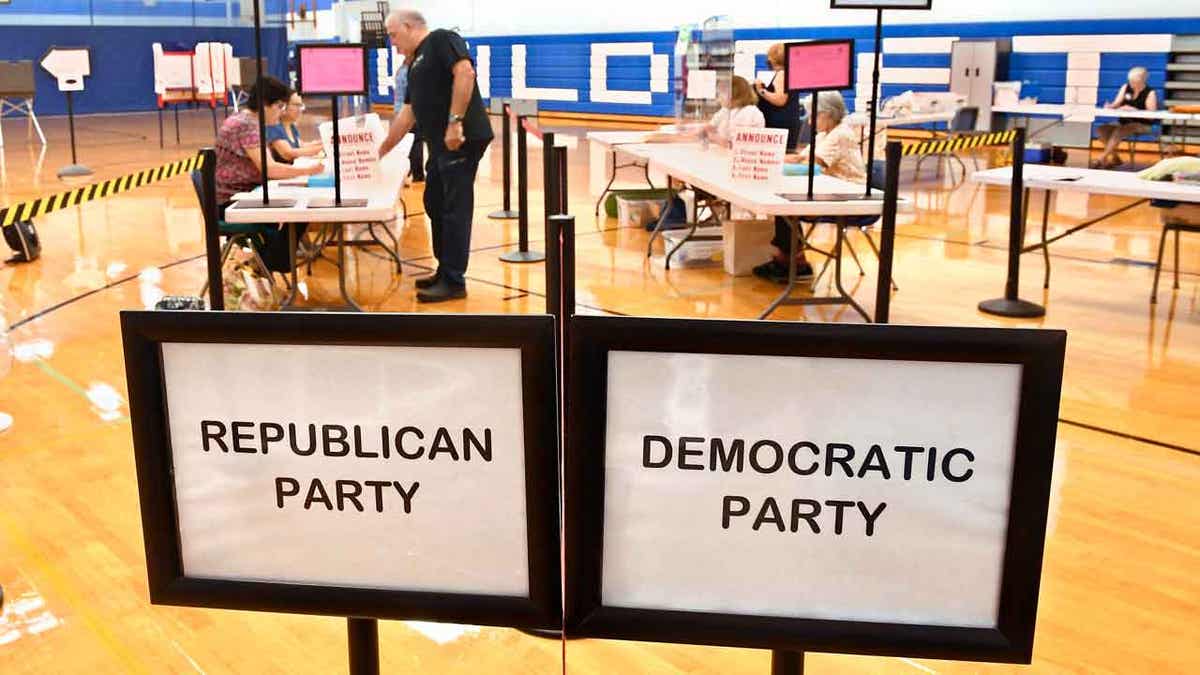
A voter checks in at Suffield Middle School on primary election day, Aug. 9, 2022, in Suffield, Connecticut. Voters in several states are deciding measures that could affect the way they cast ballots in future elections. While some measures would expand access to voting, proposals elsewhere would impose new identification requirements to cast ballots or raise the threshold to pass citizen initiatives. (AP Photo/Jessica Hill, File)
The Fox News Voter Analysis (FNVA), a survey of more than 90,000 voters nationwide, highlights the election’s main themes and central demographic groups – and, when compared to FVNA results from the 2018 and 2020 elections, shows key changes that generally favored the GOP.
Republicans got strong base support, particularly from White evangelicals, rural voters, Whites without a college degree and conservatives.
A GUIDE TO THE FOX NEWS 2022 ELECTIONS EXPERIENCE
Most demographic groups shifted rightward compared to the 2020 election. Some of the most consequential shifts came among groups that backed Biden two years ago. Women, for instance, voted for Biden by 12 points in 2020 and for Democrats this year by just 4 – an 8-point shift to the Republicans. Other notable GOP gains included voters under age 30 (12-point shift), Black voters (+15 points), Hispanics (+10 points), college graduates (+11 points), moderates (+11 points) and suburban voters (+9 points).
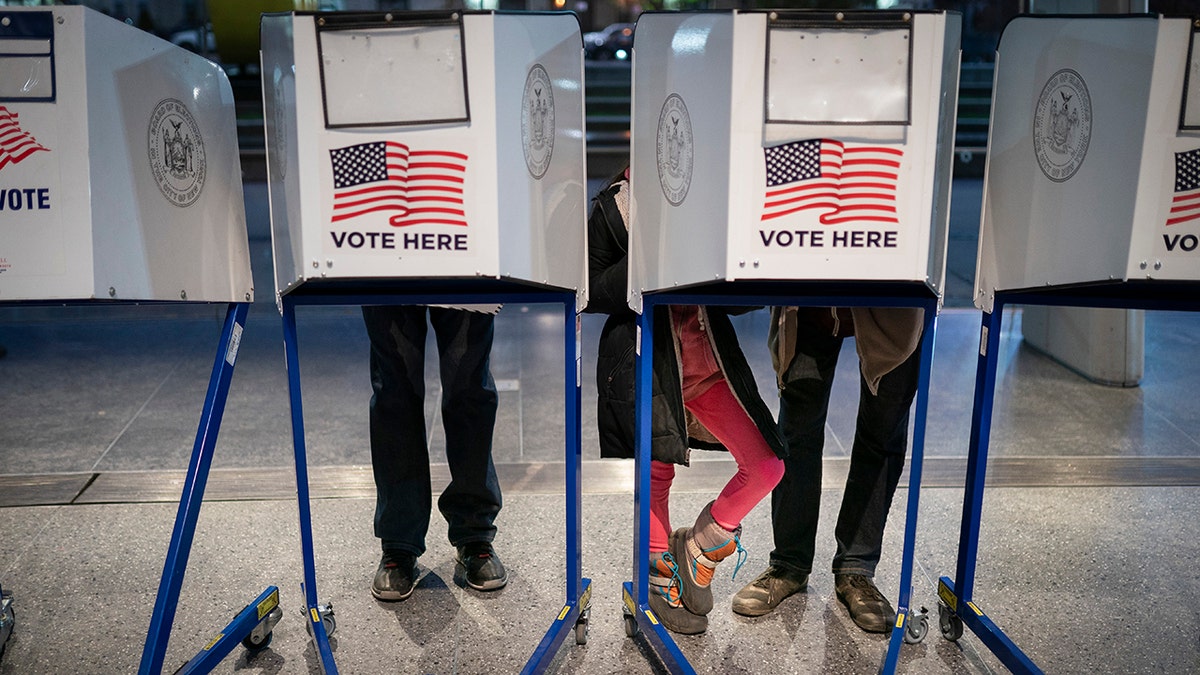
Voters fill out their ballots before bringing them to counting machines at a polling site in the Brooklyn Museum as the doors open for the midterm election, Tuesday, Nov. 8, 2022, in the Brooklyn borough of New York. (AP Photo/John Minchillo)
Democrats’ best groups included liberals and urban residents – as well as Black voters, despite the decline relative to 2020.
Overall, Democrats won suburban voters by just 1 point, a far cry from Biden’s 10-point edge in the suburbs two years ago – in large part due to a rightward shift among suburban White women, who backed Biden by 5 points two years ago and Republicans by 7 this year.
MIDTERM ELECTIONS 2022 ARE UNDERWAY AS VOTERS HEAD TO POLLS, CONTROL OF CONGRESS IS ON THE BALLOT
Democrats also had a 1-point edge among college-educated White voters, down from a 7-point advantage two years ago. Republicans expanded on their 25-point 2020 margin among noncollege Whites and won White voters overall by 17points.
Military households (+14 points), gun owner households (+28 points), and those who regularly attend religious services (+29 points) all broke heavily for Republicans. Democrats won union households (+12 points), while parents split between the two parties.
Most self-identified Republicans (94%) backed GOP Congressional candidates; most Democrats (95%) stayed true to their side. Independents narrowly favored Democrats after backing Biden by 15 points two years ago.
ARKANSAS GOVERNOR: REPUBLICAN SARAH HUCKABEE SANDERS DEFEATS CHRIS JONES

President Biden speaks during a rally for gubernatorial candidate Wes Moore and the Democratic Party on the eve of the U.S. midterm elections, at Bowie State University in Bowie, Maryland, on Nov. 7, 2022. (Mandel Ngan/Getty Images)
In keeping with this party loyalty, a majority of voters knew which candidate they would support all along. Late deciders were split.
Beyond the demographic trends, it was an election marked by frustration and pessimism, as three-quarters of voters felt the country was headed in the wrong direction.
That marks an increase over recent elections. In 2020, 60% of the electorate said the country was on the wrong track; in 2018, 58% felt that way.
The pessimism extends to the future, as voters thought life for the next generation would be worse rather than better by a wide margin. That margin was 26 points four years ago.
Diminished hopes for the future were coupled with anger about the present. Nearly three-quarters were angry or dissatisfied with the way the federal government is working.
DESANTIS CRUSHES CRIST TO CRUISE TO RE-ELECTION IN FLORIDA
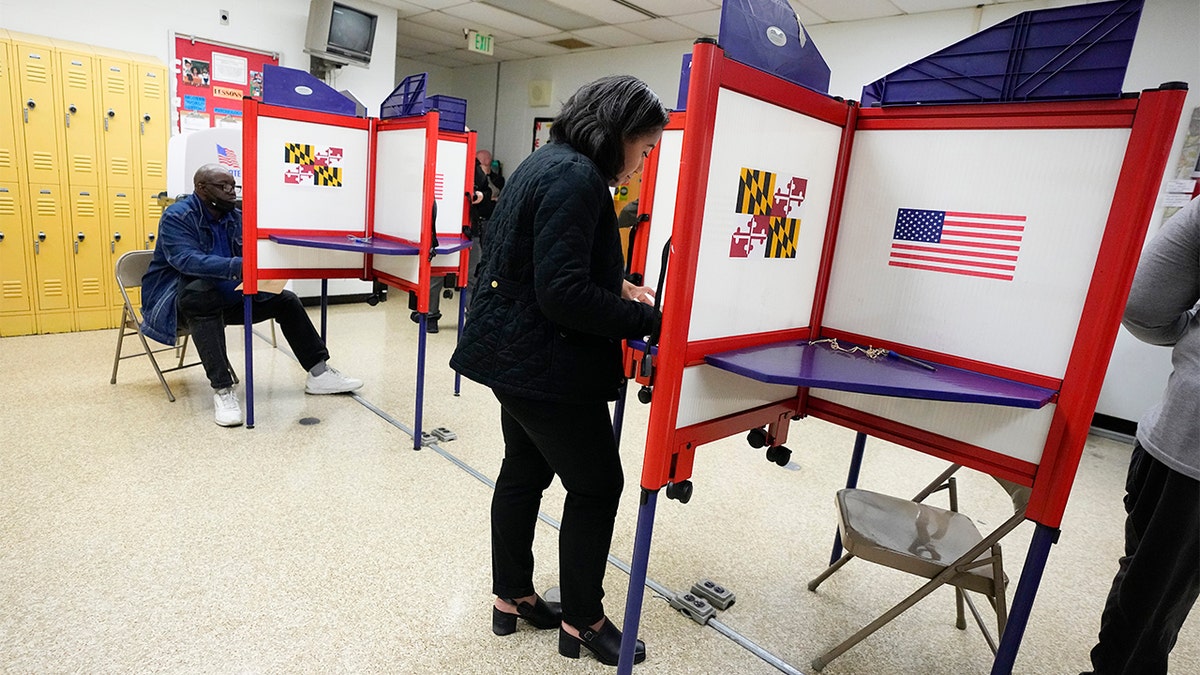
People fill out ballots during early voting at Westside Skill Center, Oct. 31, 2022, in Baltimore. Midterm elections are being held on Tuesday, Nov. 8. (AP Photo/Julio Cortez, File)
Those enthusiastic or satisfied with the federal government voted for Democratic candidates by 65 points. Dissatisfied voters went for Republican candidates by 7 points, while angry voters were firmly in the GOP column (+51 points).
Voters’ frustrations with the government were clearly reflected in their evaluations of Biden’s job performance and – to an even greater extent – the job Congress is doing (27% approve, 73% disapprove).
But, faced with a host of national and local challenges, many voters were asking for better government, not necessarily less. Just over half felt the government should be doing more to solve problems. Slightly more (57%) felt that way in 2020, slightly fewer in 2018 (50%).
With inflation at its highest levels in 40 years, the Supreme Court overturning Roe v. Wade, rising violent crime rates, threats to the democratic process, and an increase of migrants at the southern border, there was no shortage of potential problems to solve – and no shortage of material for candidates and campaigns to emphasize.
Nearly half of voters said the economy was the most important issue facing the country. Abortion, immigration, and climate change formed a distant second tier, with crime (8%), health care (7%), and gun policy (6%) not far behind. The coronavirus pandemic – the top issue of the 2020 election – was far from a top concern (2%).
TRUMP MOCKS DESANTIS AT PENNSYLVANIA RALLY: 'RON DESANCTIMONIOUS'
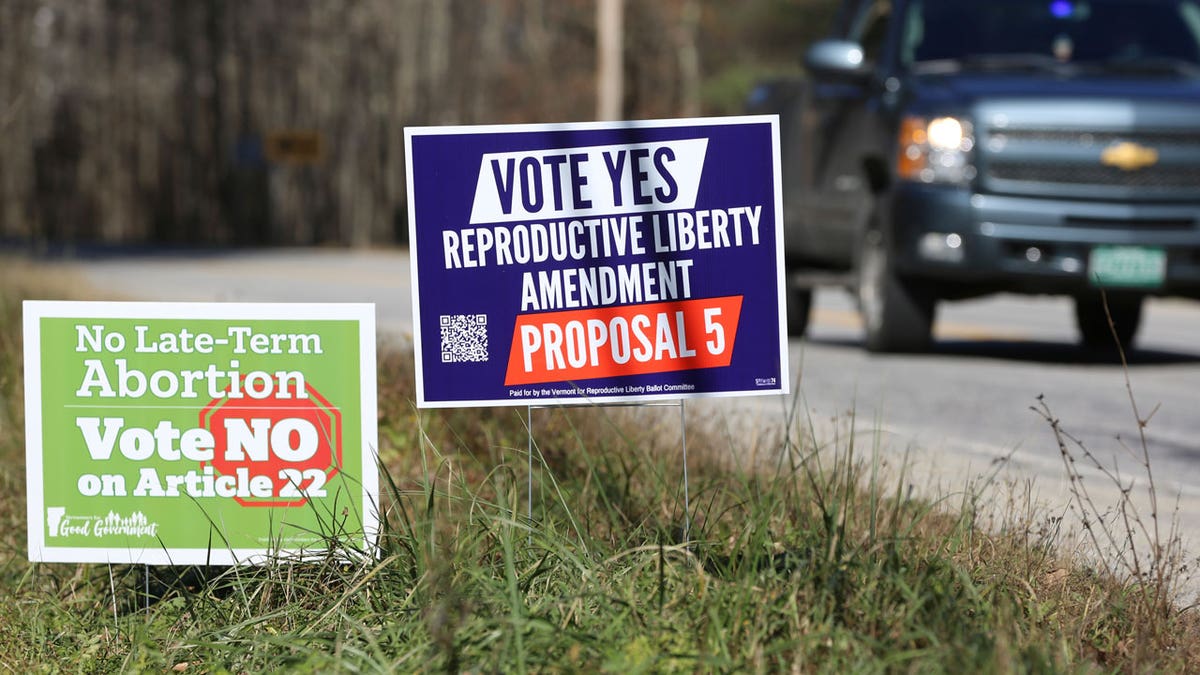
Opposing campaign signs supporting a proposed amendment to the Vermont constitution that would guarantee access to reproductive rights, including abortion, by the side of the road in on Nov. 3, 2022 in Middlesex, Vt. (AP Photo/Wilson Ring)
Half of voters (51%) said inflation was the single most important factor to their vote, and they went heavily for Republicans. The GOP also racked up a 14-point margin among the 25% who were primarily focused on rising violent crime rates.
On the other hand, 44% said the future of American democracy was paramount, and they backed Democrats. The 25% who prioritized the Supreme Court overturning Roe v. Wade also went for Democrats by 44 points.
Views of the economy were decidedly poor, as three-quarters gave economic conditions a negative rating. Two years ago – with coronavirus cases surging and no vaccine – 43% gave a positive economic rating and 57% a negative one.
One-third of voters said they are falling behind financially, a sharp uptick from both 2020 (18%) and 2018 (16%).
Those falling behind backed Republicans by 28 points, while the margin was much closer (Democrats +6) among those who were holding steady financially.
Still, two-thirds were confident they could keep up with their expenses (67%) and find a good job if they needed to (65%). Voters were somewhat less confident they could rely on Social Security benefits in the future (50%).
CONSERVATIVES TURN ON TRUMP FOR ATTACKING RON DESANTIS AHEAD OF MIDTERMS: ‘WHAT AN IDIOT’
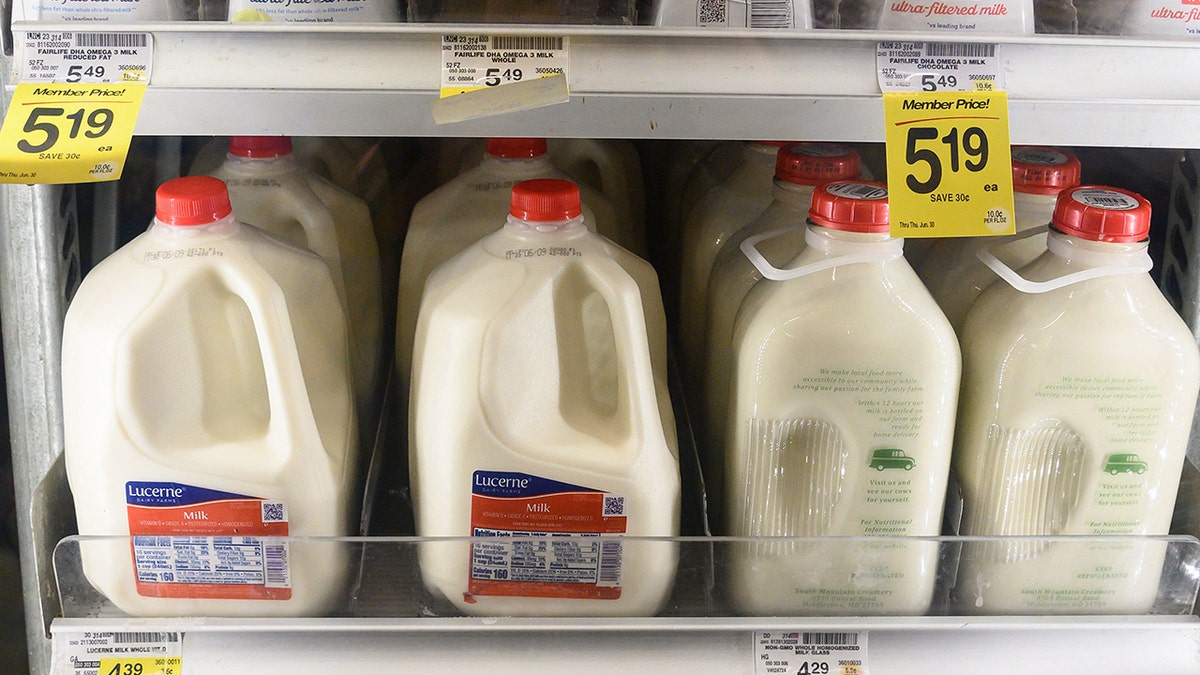
Milk prices displayed in a supermarket in Washington, DC, on May 26, 2022 amid the U.S. inflation crisis. (NICHOLAS KAMM/AFP via Getty Images)
Slightly more trusted Biden (44%) and Democrats in Congress (45%) to handle Social Security policy than trusted Republicans (39%).
A majority blamed Biden’s policies for inflation rather than factors outside the president’s control.
Unsurprisingly, those who blamed Biden for inflation broke heavily for Republicans (+67 points), while those who attributed rising prices to other factors went for Democrats (+71 points).
While voters’ economic frustrations were undoubtedly a boon for Republicans, the Supreme Court decision overturning Roe clearly boosted Democrats. More voters were angry about the decision as were happy about it, and those most upset with the ruling went overwhelmingly for Democrats (+68 points).
Views of the Supreme Court split: 51% approved of the Court, 49% disapproved.
Nearly two-thirds said abortion should be legal in all or most cases – a slight increase from 2018 (60% legal in all/most cases) and 2020 (59%). Fewer than one-in-ten felt it should always be illegal.
All told, 62% favored a national law guaranteeing access to abortion, while 38% opposed.
An even wider majority, including 65% of Hispanics, favored increasing law enforcement at the U.S.-Mexico border.
Views on immigration split down the middle: 53% think immigrants help the country, 47% think they hurt it. That’s a much closer divide than in 2018 (59% help, 38% hurt). Those who felt immigrants help the country favored Democrats (+48 points), while those with a more negative view of immigrants backed Republicans by a similar margin (+56 points).
Eight-in-ten (80%) were very or somewhat concerned about crime in their local community, while somewhat fewer were concerned about opioid use (73%). Many voters laid the blame for crime on Biden’s doorstep.
Despite some Republican calls to increase gun ownership in the name of self-protection, a majority (57%) felt gun laws should be stricter. These voters backed Democrats by 47 points. The 29% who wanted gun laws kept as they are went for Republicans (+68 points), as did the 14% who favored less strict gun laws (+70 points).
TWITTER USERS MOCK CHRIS HAYES AS HE FLIP-FLOPS, DEVLARES ‘GOP VICTORY’ WON'T BE 'END OF DEMOCRACY
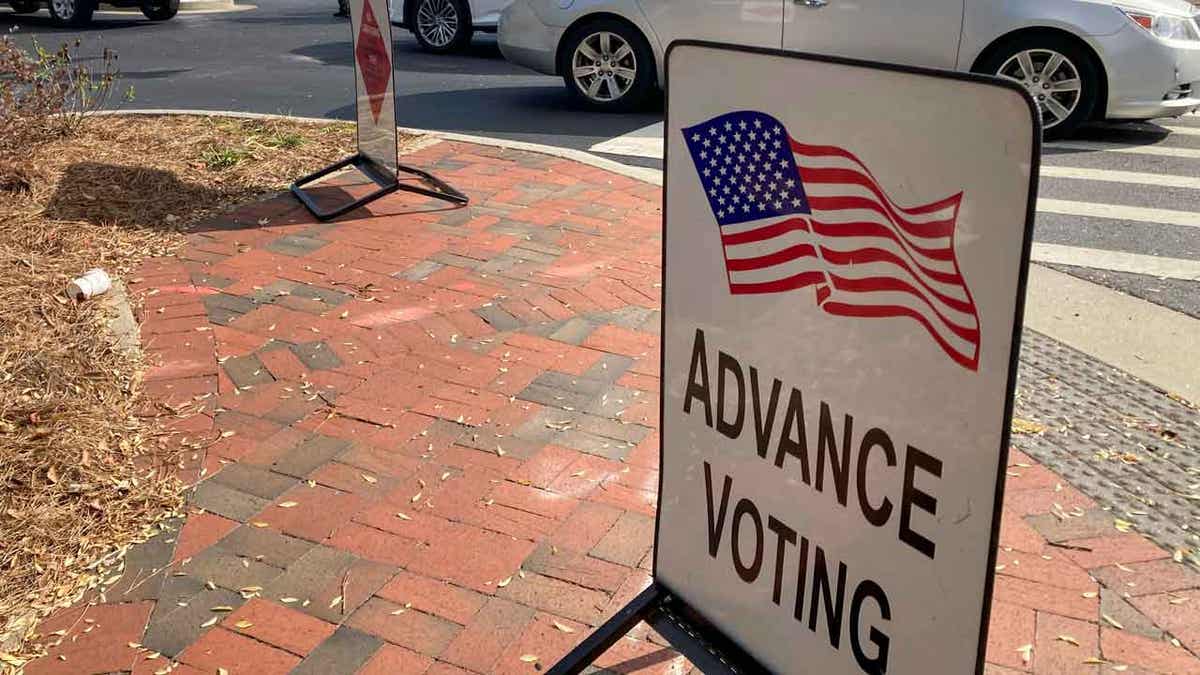
A sign showing the way for voters stands outside a Cobb County voting building during the first day of early voting, Monday, Oct. 17, 2022, in Marietta, Ga. (AP Photo/Mike Stewart)
Compared to concerns about crime, the local effects of climate change (62% concerned) and the coronavirus pandemic (51%) were a lesser focus for voters.
While a wide majority (77%) favored a national mask mandate in 2020, one-third of voters this year felt their local public schools had gone too far in responding to COVID.
Simmering discontent with public schools surfaced in other areas as well, as half felt their local elementary schools teach too much about gender identity (52%) and sexual orientation (51%). Fewer (35%) thought there is too much time spent on racism in the U.S.
On each subject, parents’ views mirrored those of the broader electorate.
Although some voters felt schools were too focused on racism, roughly seven-in-ten (72%) said racism is a serious problem in the country – a slight decrease from 2020 (76%). Similarly, 71% saw racism in policing as a serious problem, compared to 70% in 2020.
If midterm elections are a report card on a president’s first two years in office, this might be one Biden wants to leave crumpled at the bottom of the backpack. Beyond disapproving of the job he is doing overall, voters gave Biden net negative ratings on his handling of a wide range of issues: the economy (-22 points), border security (-20 points), China (-18 points), Russia (-16 points), energy policy (-10 points), student debt (-4 points), and climate change (-4 points).
Even with the negative marks on handling Russia, voters were more likely to say the U.S. is taking the right approach to the ongoing war in Ukraine than think the U.S. should be more active or less active in its support for Ukraine.

Russian President Vladimir Putin talks to Chinese President Xi Jinping during a meeting on the sidelines of the Shanghai Cooperation Organisation (SCO) summit in Samarkand, Uzbekistan, Thursday, Sept. 15, 2022. (Alexandr Demyanchuk, Sputnik, Kremlin Pool Photo via AP)
DEM, REPUBLICAN POLITICAL MACHINES SPENT STAGGERING $1B+ ON JUST FIVE SENATE RACES
Biden’s personal standing with voters has also eroded, as 42% held favorable views of the president versus 56% unfavorable. In 2020 that stood at 50% favorable and 48% unfavorable.
Opinions of Vice President Kamala Harris (38% favorable, 56% unfavorable) also worsened since 2020 (47% favorable, 47% unfavorable).
The story was similar for Biden on several key traits. Less than half said he is a strong leader (35%, down 12 points from two years ago), has the mental capacity to serve effectively (42%, down 9 points), honest (45%, down 5 points), or cares about people like them (47%, down 7 points).
Four-in-ten voters also felt the Biden administration was less ethical than previous administrations. While not a good mark, it was better than the 52% who said the same about the Trump administration during the 2018 midterms.
Despite these negative numbers, the election was not purely a referendum on Biden. Instead, nearly as many voters (58%) said their vote was about former President Donald Trump as said Biden was a factor (65%). More said their vote was about opposition to Trump (35%) than support for him (23%), and the split was similar among those for whom Biden was a factor.

Former U.S President Donald Trump speaks at a 'Save America' rally on October 22, 2022 in Robstown, Texas. (Brandon Bell/Getty Images)
Overall, 43% held a favorable view of Trump, down from 46% two years ago.
TRUMP COULD POTENTIALLY ANNOUNCE A 2024 CAMPAIGN A WEEK AFTER THE MIDTERMS, SOURCES SAY
The Democratic Party (43% favorable) and Republican Party (46%) did not fare any better in voters’ estimation.
But the partisan divide is even deeper. Just 10% of Democrats thought Republicans try to do what’s right for the country all or most of the time – mirroring Republicans’ views of Democrats (10% try to do what’s right).
Recent political violence – from the shooting of Republican Whip Steve Scalise in 2017 to the January 6 Capitol riot to the assault at House Speaker Nancy Pelosi’s home in late October – is the ultimate expression of these partisan fissures.

In this Wednesday, Jan. 6, 2021 file photo, Trump supporters try to break through a police barrier at the Capitol in Washington. ((AP Photo/Julio Cortez, File)
Overall, 53% said the Democratic Party was too tolerant of extremist groups, an increase from the 44% who felt that way about Biden in 2020. A similar number (53%) felt the way Democrats talk about politics was leading to violence, a 6-point increase from 2018.
Views of Republicans are almost identical: 53% felt the GOP was too tolerant of extremists (56% said the same about Trump in 2020), and 56% said Republican rhetoric led to violence (no change from 2018).
With some across the country voicing doubt about the legitimacy of the 2020 election, the integrity of the electoral process became a flash point once again this year. Nearly three-quarters of voters were confident votes would be counted accurately, an increase from the 69% who were confident in 2020.
CLICK HERE TO DOWNLOAD THE FOX NEWS APP

Voters fill out their ballots before bringing them to counting machines at a polling site in the Brooklyn Museum as the doors open for the midterm election, Tuesday, Nov. 8, 2022, in the Brooklyn borough of New York. (AP Photo/John Minchillo)
Overall, far more were confident that eligible voters would be allowed to vote (86%) than that those not eligible would be prevented from doing so (64%).
Methodology
The Fox News Voter Analysis is a survey of more than 90,000 voters and 20,000 nonvoters conducted October 31 through November 8. Full methodological details are available here.













































